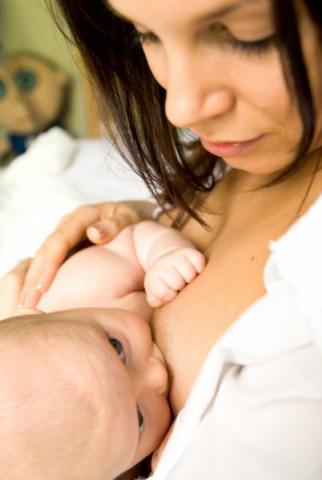Breastfeeding could help save the health service money

The Public Health Agency (PHA) welcomes a UNICEF report, launched yesterday, (18 October) that makes a strong financial case for investing in better support services for women to enable them to start breastfeeding and continue for as long as they wish.
The purpose of the report ‘Preventing disease and saving resources: the potential contribution of increasing breastfeeding rates in the UK’ was to produce evidence to show if investing in good quality breastfeeding support services would be a cost-effective policy option so that, as the NHS reshapes itself and makes tough financial decisions, we can meet the needs of the mother and child.
Janet Calvert, Health and Wellbeing Improvement Manager at the PHA, said: “The many health benefits of breastfeeding for both mother and baby are well documented and although more women are breastfeeding, a lack of information and support often means that many breastfeeding mums stop before they want to. It is really important that families and society as a whole are made aware of the substantial impact breastfeeding has on health and wellbeing and that women are supported to make well informed choices about how they feed their babies”
The report highlights that investment in effective services to increase and sustain breastfeeding rates is likely to provide a return within a few years. If half of mothers who currently do not breastfeed were to do so for up to 18 months of their lifetime, it is estimated that there would be up to 865 fewer cases of breast cancer, with a huge potential impact on the suffering caused by the disease and in addition cost savings to the NHS of over £21 million.
And the report suggests that if 45% of babies were exclusively breastfed for four months, and if 75% of babies in neonatal units were breastfed at discharge, each year it is estimated that there would be some 5,916 fewer babies hospitalised with respiratory illness, 22,248 fewer GP consultations, with saving of approximately £6.7 million, not to mention the untold worry and stress caused by such conditions for parents*
Janet continued: “In Northern Ireland, we have seen an encouraging increase in the percentage of mothers who breastfeed, with breastfeeding rates at discharge from hospital increasing from 40% in 2004 to 45% in 2010. However, the figures indicate that we need to target breastfeeding support to improve our low breastfeeding rates among young mothers and women on low incomes, as figures suggest that twice as many mothers over the age of 20 will breastfeed compared with those under age 20.”
The PHA is committed to improving breastfeeding rates in Northern Ireland through promoting effective approaches to providing information and support to pregnant women and new mothers. The PHA is working with UNICEF Baby Friendly Initiative to ensure that maternity and community health care facilities have breastfeeding policies and training in place. As part of ongoing work in supporting breastfeeding families, the PHA also runs the ‘Breastfeeding Welcome Here Scheme’, which is a regional initiative to encourage and improve social acceptability of breastfeeding, ensuring that the environment is as supportive of breastfeeding as possible. The scheme identifies places that are breastfeeding friendly and was launched seven years ago; it now has over 300 members throughout Northern Ireland
“For mothers who haven’t breastfed before, it may seem daunting, so the PHA is working with partners to roll out a programme of peer support. This means that someone who has herself successfully breastfed, and has undergone training on breastfeeding, is available from the local community to support breastfeeding mothers.
“Mother-to-mother peer support programmes are in place in many areas and are working with expectant and new mothers to help them breastfeed for longer. There are also 70 breastfeeding support groups which provide ongoing support for breastfeeding mothers throughout Northern Ireland,” Janet concluded.
Contact PHA Communications on (028) 9055 3663.
* Preventing Disease and Saving Resources: potential contribution of increasing breastfeeding rates in the UK, was carried out by a multi-university academic team including Dundee University, Oxford University, University of York, Brunel University, and St George’s, University of London, as well as the National Childbirth Trust.
The full report can be found at http://www.unicef.org.uk/Latest/News/breastfeeding-report-nhs-savings/
